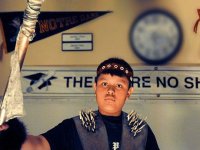How Rafe Esquith’s 5th Graders Became the World Famous Hobart Shakespeareans
Your content has been saved!
Go to My Saved Content.Editor's Note: This post is an excerpt from Real Talk for Real Teachers by Rafe Esquith. Reprinted by arrangement with Viking, a member of Penguin Group (USA) LLC, A Penguin Random House Company. © Rafe Esquith and Barbara Tong, 2013.
The special activity that has kept me engaged for three decades is the annual production of a Shakespeare play. It did not start out this way. Many good ideas evolve slowly, taking shape over many years and constantly getting better. The backstory of our productions might give you a notion of how your special idea might take shape and become a unique force in the life of your students.
Rafe Esquith’s fifth grade class, The Hobart Shakespeareans, perform The Tempest.
The Play's the Thing
I began teaching at Hobart Elementary School in 1985. Even the greenest of teachers could see that most of the students there were far below grade level, and the common factor in the rate of failure was poor language skills. Many of the children were still learning English, so they were not behind because of a lack of ability. Grasping grammar and basic reading skills could help these children catch up, but I thought that if the students were given the opportunity to stay after school and learn about Shakespeare, it might make things more fun for them. Of course, old Will would be very challenging for even fluent nine- and ten-year-old kids, but with my help and enthusiasm, I thought we might give it a try.During regular school hours, rude students and other problems are basic to any room full of youngsters who, by the grace of the state, are a captive audience. But this is not the case when you create a voluntary extracurricular activity. The students who come to Shakespeare want to be there, and also are quite aware that if their behavior and work ethic are not exemplary they will be shown the door. As a result, the 40 or more students in the shows always paid attention and gave their best effort for the entire rehearsal. For a teacher, it really was heaven on Earth.
The students in the shows had spent more time with me, and as a result were more attentive during daily lessons. Their positive attitudes helped shape our class culture, and even the apathetic students were more likely to make an effort in class because so many around them were behaving.
Within five years, the kids were performing rudimentary plays right in Room 56. They were messy, fun, and the students learned a lot. Simultaneously, I began classical guitar lessons for interested students during their recess and lunch breaks. Soon they were holding their own year-end concert.
To Thine Own Self Be True
I was making a mistake, however, during those early years. For a little while, the play became more important than the lessons I was supposed to be teaching. Part of the problem was that I had not clearly defined in my mind or the minds of the students a specific set of objectives. Sure, the students were learning tons of language and becoming accomplished musicians, but there was too much focus being placed on the final product. It would be better to place the emphasis on the journey and not the final creation. Realizing this helped me correct my course. Such is the beauty of developing something over a long time.
Another mistake was that we held the concerts in the school auditorium. It dawned on me that being in the auditorium shifted the emphasis to pleasing a big audience. The mistake was confusing the final product with the process of learning. I was wasting time worrying about how many people would see the concert that could have been spent helping the kids become better musicians and people. It was time to take two good ideas and fuse them into something magical.
I listed the objectives of both the Shakespeare and the music programs and found that many of the goals were the same . . . skills that will serve each student for the rest of his life and not simply for the show. The goals are discussed with the children on an almost daily basis:
- The students will learn large amounts of new vocabulary through Shakespeare.
- The students will increase their ability to focus for long periods of time.
- The students will improve their patience.
- The students will learn to work as a team.
- The students will learn to stand up and speak confidently in front of others.
- The students will learn not to be afraid of making mistakes.
- The students will be supportive of peers who struggle.
- The students will practice independently to perfect skills.
- The students will make a yearlong commitment to a project and finish what they start.
Be Not Afraid of Greatness
Notice that there is no mention of the production itself. As I stepped back and clearly defined the objectives of the production, everything got better. The students became far better musicians and singers. The actors began to own the language in ways they had never done before. I became a better teacher. No rehearsal was ever about the show. Instead, 90 minutes a day was spent with all the children finding their rhythm as they spoke Shakespeare's language. And the better they spoke, the more they wanted to improve. Sir Ian McKellen has remarked that "the best thing about the Hobart Shakespeareans is that they know what they're saying, and that can't be said about even professional actors doing Shakespeare."
